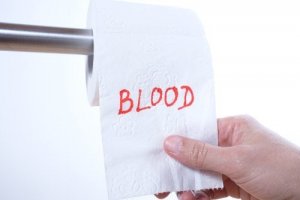Rectal Bleeding: Why Does it Happen?


Written and verified by the doctor Leonardo Biolatto
Rectal bleeding can be quite scary. This is because almost everyone knows it’s one of the symptoms of colon cancer. However, finding blood when going to the bathroom can be due to many other reasons. Not all of them are serious.
Norberto Mañas, a specialist at the digestive unit at the Hospital Clinico de San Carlos in Madrid, points out:
“It’s normal to be alarmed, because blood is gory. The first thing you often think about when you bleed is that something is wrong. However, the most frequent reason for rectal bleeding isn’t necessarily due to something bad. However, that’s no reason not to run it by your doctor, especially if you’re over 50 years old.”
Due to its frequency and possible seriousness, we’ll explain the main causes of rectal bleeding in today’s article.
How does blood appear in the stool?

- You can see the blood yourself. It usually stains the toilet paper after you wipe. Also, it may even appear to drip after using the bathroom, and this is due to bleeding at the end of the intestine or in the anus. Finally, it’s the type of blood that usually comes along with hemorrhoids or other fissures.
- There’s black, tarry stool. These are black stools with a foul odor. They’re usually due to bleeding in the upper part of the digestive system. Actually, they’re more serious than the previous case of bleeding
- Stool mixed with blood or clots. These tend to appear in inflammatory bowel diseases. They may also occur when there’s a presence of polyps and also with cancer.
- Hidden blood. This kind isn’t visible to the naked eye. In fact, only a medical test can detect it. However, other symptoms such as anemia for no obvious reason may indicate that there’s hidden blood in the stool. In these cases, a doctor must do a colonoscopy.
What causes rectal bleeding?
As we mentioned above, the most alarming reason is colon cancer. However, it’s not the only situation in which blood may appear in your stool. Other causes are:

- Hemorrhoids. These are dilated veins in the anus and rectum. They occasionally occur in 3 out of 4 adults. Also, their most common cause is excessive strain when constipated. They’re also frequent in mothers.
- Anal fissure. This is a small tear of the mucous membrane that covers the anus. It can happen after expelling large and hard stools. It also has to do with constipation.
- Diverticula. These are small lumps in the large intestine and their incidence increases with age.
- Intestinal polyps. This is the extra tissue that frequently grows in the large intestine. Most of them aren’t dangerous. However, some could be carcinogenic.
- Gastric or duodenal ulcers. These are lesions in the wall of the stomach or intestine. Just like other problems in the esophagus, they can lead to black, tarry stools.
- Certain alterations of blood vessels. Vasculitis or angiodysplasia can cause rectal bleeding.
- Some infections.
- Inflammatory diseases of the digestive tract. Crohn’s disease and ulcerative colitis usually occur when there’s rectal bleeding.
You might like Crohn’s Disease: Symptoms and Treatment
If you have rectal bleeding
As you can see, rectal bleeding can have many different causes. Also, it isn’t always easy to diagnose, so it could be a lot more serious than you think. Therefore, you should always consult your doctor.
Make notes so you can provide them as much information as you can about any changes in your stool. Write down the color, frequency, and form of bleeding as these facts are very important for a proper diagnosis. This is why doctors often recommend looking at your stool.
Similarly, you should do a stool test periodically if your above 50 years old. Doctors can do a test with a strip. The goal is to detect hidden blood that isn’t visible to the naked eye. Likewise, they might also do a rectal examination as it helps them detect any hemorrhoids and tumors in it. Also, it’s good for detecting prostate problems. It’s an uncomfortable test, but worth the peace of mind.
Colonoscopies are the most effective tests to rule out colon cancer. Depending on the type of blood in your stool, they may do other diagnostic tests such as gastroscopy, radiography or scintigraphy.
You may be interested: The Diet and Preparation Before a Colonoscopy
Conclusion
Don’t worry if you find blood in your stool. The reasons vary, and it’s quite common for the culprit to be either hemorrhoids or an anal fissure. However, don’t hesitate to consult your doctor so they can rule out any other causes.
All cited sources were thoroughly reviewed by our team to ensure their quality, reliability, currency, and validity. The bibliography of this article was considered reliable and of academic or scientific accuracy.
- Dennis Kasper, Anthony Fauci, Stephen Hauser, Dan Longo, J. Larry Jameson, J. L. (2018). Harrison. Principios de Medicina Interna, 19e | AccessMedicina | McGraw-Hill Medical. In Harrison.
- Sangre en las Heces – Fundació Olga Torres. (n.d.). Retrieved July 23, 2019, from http://www.fundacionolgatorres.org/aparato_digestivo/preguntas_frecuentes/sangre_en_las_heces/
- Sangre en las heces fecales. (n.d.). Retrieved July 23, 2019, from https://www.cancer.org/es/tratamiento/tratamientos-y-efectos-secundarios/efectos-secundarios-fisicos/cambios-urniarios-y-de-excrecion/sangre-en-las-heces-fecales.html
- El síntoma de sangre oculta en las heces no siempre es cáncer. (n.d.). Retrieved July 23, 2019, from https://www.sabervivirtv.com/medicina-general/sintoma-sangre-oculta-heces-siempre-cancer_879
This text is provided for informational purposes only and does not replace consultation with a professional. If in doubt, consult your specialist.








